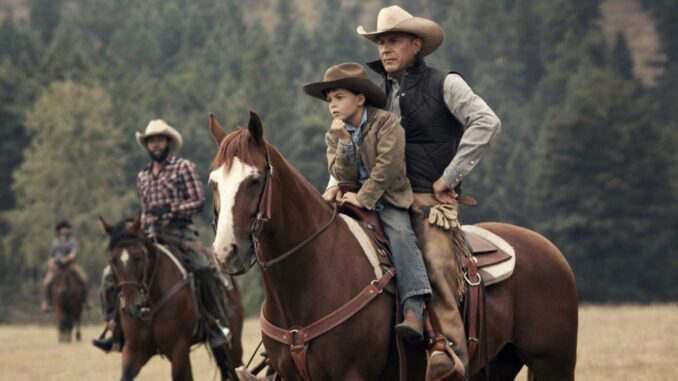
The vast, sun-drenched plains and towering peaks of Montana have, for the past half-decade, become synonymous with the Dutton family, a modern American dynasty clinging to the largest contiguous ranch in the United States. At the heart of this sprawling saga, Kevin Costner’s John Dutton III stands as a monolith—a stoic, gravel-voiced patriarch whose craggy visage embodies the very land he fights to preserve. His journey through “Yellowstone” has been nothing short of epochal, transforming a cable drama into a cultural phenomenon, yet it is a journey now marred by whispers, rumors, and a very public, dramatic unraveling that mirrors the show’s own themes of legacy, conflict, and the brutal cost of holding on.
When “Yellowstone” first galloped onto screens, it filled a void many didn’t realize existed: a return to the American Western, but infused with contemporary grit, corporate intrigue, and operatic family drama. Kevin Costner, an actor whose career is steeped in the mythology of the frontier (from “Dances with Wolves” to “Open Range”), was the perfect anchor. He didn’t just play John Dutton; he became him. His weathered gravitas, the subtle flicker of pain in his eyes beneath the steely resolve, and his inherent understanding of the land’s spiritual pull made John Dutton more than a character; he was an archetype, a symbol of a fading way of life confronting the relentless march of progress. Costner’s performance was the gravitational pull that drew millions into the Dutton orbit, solidifying “Yellowstone” as a ratings juggernaut and a cornerstone of the Paramount+ universe.
Yet, beneath this triumph, a tempest has brewed. For months, whispers about Costner’s commitment to “Yellowstone” morphed into blaring headlines, culminating in his confirmed departure before the final episodes of Season 5 could even be filmed. The “new season rumors” quickly became a bitter public narrative: alleged scheduling conflicts with his passion project, the multi-part Western film epic “Horizon: An American Saga”; claims of demands for reduced filming time; and a perceived shift in focus away from the show that cemented his late-career resurgence. Fans felt a palpable sense of betrayal, questioning how “Yellowstone,” so intrinsically tied to its lead, could possibly conclude without him. The drama unfolding off-screen, a battle of wills between a visionary creator (Taylor Sheridan) and an iconic star, ironically echoed the power struggles and land disputes that define the Duttons' fictional world. Can a king truly abandon his kingdom mid-war?
Beyond Costner’s narrative, the “Yellowstone” cast, too, has contributed to the show’s authenticity, often blurring the lines between their characters and their real lives. Cole Hauser, who embodies the fiercely loyal and perpetually brooding Rip Wheeler, carries an undeniable ruggedness, a quiet intensity that feels less acted and more innate, perhaps informed by his own lineage (his great-grandfather was a major Hollywood figure, his mother owned a film production company). Kelly Reilly’s portrayal of Beth Dutton, the venomous, vulnerable, and fiercely intelligent daughter, is so searingly raw that one wonders about the emotional toll. And then there are the genuine cowboys: Forrie J. Smith (Lloyd Pierce) and Jake Ream (Jake) are real-life wranglers who bring an unparalleled authenticity to the ranch scenes, their calloused hands and knowing glances a testament to a life lived on horseback. Gil Birmingham (Thomas Rainwater) carries the weight of history and cultural pride in his portrayal, his advocacy for Indigenous peoples extending beyond the screen. This deep well of real-life experience and personality among the ensemble cast has always been a vital component of “Yellowstone’s” success, grounding its high-stakes drama in undeniable verisimilitude.
The ultimate irony of Costner’s “Yellowstone” journey is that his departure, whether by mutual agreement or acrimonious split, has become as compelling a narrative as anything written for the screen. It is a stark illustration of the friction between creative ambition and the demands of a relentless production schedule, between the desire to control one’s legacy and the collaborative nature of a hit show. As “Yellowstone” prepares for its final chapter, potentially without its patriarch, the rumors persist: Will John Dutton be given an off-screen death? Will there be a brief cameo? Or will his absence simply be the show’s most profound, unanswered question?
Kevin Costner’s embodiment of John Dutton elevated “Yellowstone” to mythic proportions, transforming a modern Western into an exploration of American identity, land, and legacy. His journey through the series, culminating in a dramatic exit, now serves as a poignant footnote to its remarkable success. It is a story of a star whose magnetic pull helped forge an empire, only to find himself at odds with its confines—a real-life drama echoing the very struggles for power, family, and control that defined the Duttons. As the final episodes approach, the show stands at a crossroads, much like the Dutton ranch itself, facing an uncertain future but leaving behind an indelible mark on the cultural landscape, forever intertwined with the stoic man who rode the range with such profound authority.
